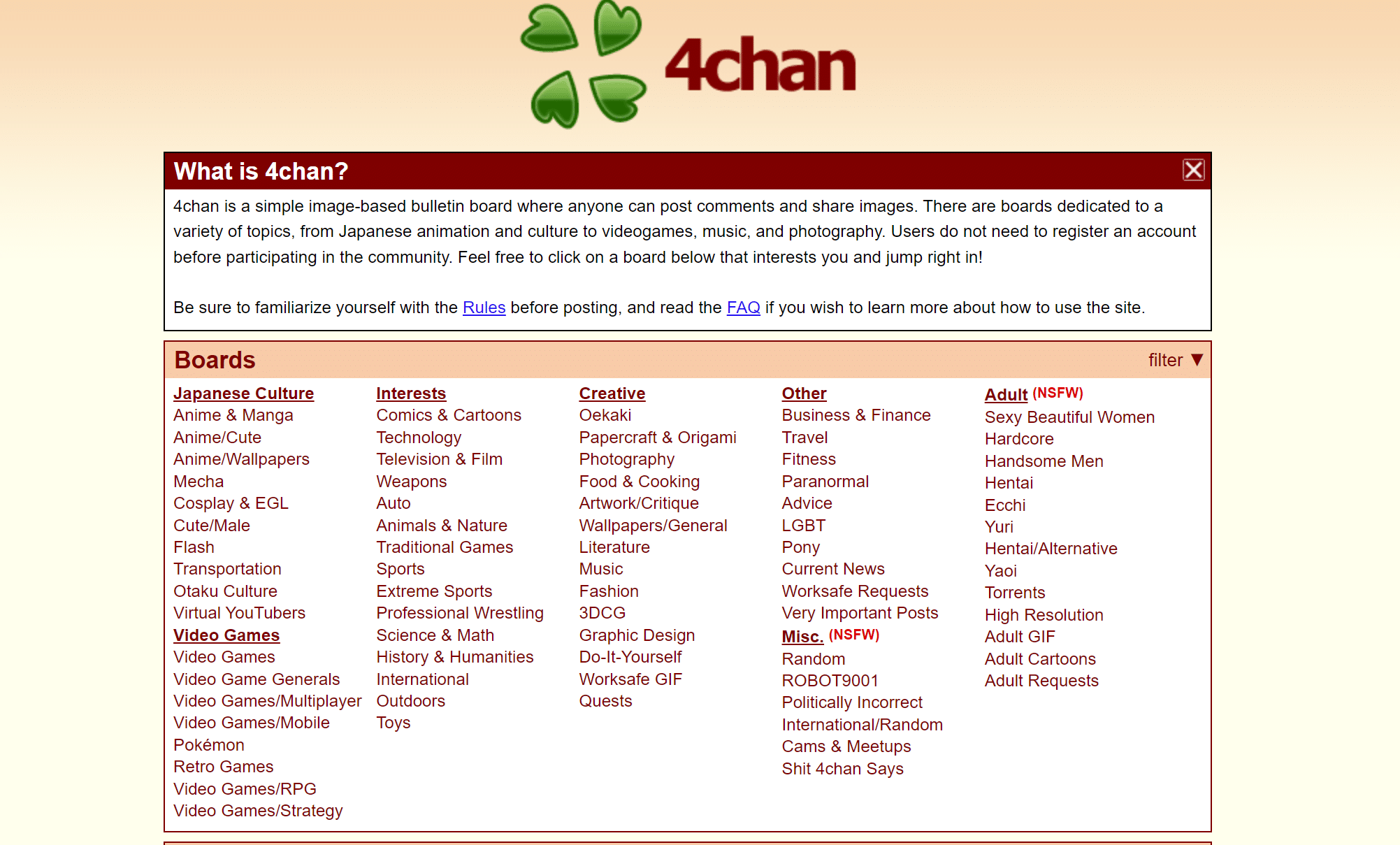Table of Contents
4chan is a recognized imageboard website predominantly embraced by young males. It was created by Christopher Poole in October 2003, as an imageboard hosting discussions on various topics.
Users can explore subjects like video games, literature, cooking, weapons, music, history, anime, fitness, politics, and sports while remaining anonymous.
It emerged as a virtual space with a user base primarily falling within the 18 to 25 age brackets, according to official demographic data. Despite this established age range, there are prevalent narratives online detailing teenage engagement with the platform.
4chan is an open online chat where folks discuss various topics, like Reddit or other forums. What sets it apart is that you don’t need an account or username, giving people the freedom to say almost anything without much accountability.
Unlike typical social networks, there’s no messaging or making friends unless someone reveals who they are. It’s a bit different, and researchers have studied its unique workings. Around 22 million users join each month, engaging in discussions ranging from coffee preferences to talking about toys. It’s a straightforward yet distinctive platform that operates in a way that has caught the interest of researchers.
4chan started by talking about anime, like a reply to Japan’s 2chan. But things changed a lot. Now, it talks about many things, from video games to explicit stuff, open to everyone. Besides sharing internet jokes, 4chan got big in politics, hacktivism, and cyber-attacks.
This made it a big deal in the news, especially about teens’ safety online. Starting with just anime, 4chan now covers lots, bringing both good and bad for teens. Parents need to get this to help teens safely use the internet. It’s not just anime anymore; it’s a mix of everything.
This mix brings both good and bad for teens, and parents need to know this to guide their teens right. So, parents should be aware of what’s happening on 4chan to guide teens through the internet world.
Understanding 4chan functionalities
On 4chan people can share images and have discussions without signing up. When you go to the site, you can pick different boards to explore different topics. A message pops up saying it’s for “mature” users, but this might be confusing for teens who think they’re mature enough.
If you want to start a conversation, you can ‘Start a New Thread’ by posting an image. You can choose to stay anonymous or use a name. Other users can reply anonymously to your post. It’s important to know that even though users can be anonymous, the site keeps track of their IP addresses. If someone breaks the rules, they can be banned, but they can also appeal the ban.
Additionally, 4chan lets people share stuff without signing up, and you can talk about different things on different boards. The site asks users to be mature, but this might be tricky for teens. When you post, you can do it anonymously, but the site keeps an eye on things and can ban you if you break the rules. If you get banned, you can try to explain why and maybe get another chance.
Controversies Surrounding 4chan
4chan is a famous website known for getting into lots of trouble. There are problems like the Gamergate issue, cyber-attacks, threats of violence in the U.S., and even child pornography. This has made people worried about the site promoting mean behavior and violence.
Even with all these dangers, teenagers still go on the site. They like it because there are funny memes shared in different groups. Also, the person who made the site was a teenager too, which might make it more appealing to young people. The mix of risky content and the feeling that it’s a place where young voices matter could be why teens ignore the dangers.
Looking at the history of the site, it’s clear that it’s a tricky balance between the controversial things on the site and young people who like the rebellious side of 4chan. Trying to handle the dangers along with the fun side of relatable jokes and a sense of young people owning the space is hard. People who care about teens using this risky platform have a tough job trying to keep them safe.
Safety Concerns for Teens on 4chan
Parents, it’s crucial to tackle safety concerns for teens on sites like 4chan. Many young folks might venture onto 18+ sites due to curiosity or peer pressure, thinking they’re more mature. To keep your teen safe, start by having open talks about age restrictions.
These rules shield children from distressing content and unrealistic ideas about life and relationships. On places like 4chan and 8chan, there’s an added risk of communities targeting vulnerable young people, spreading hate and misinformation.
Engage in discussions about your teen’s online activities. This helps you understand their digital world and encourages them to share concerns. Implement parental controls on devices and applications to limit access to certain websites. These controls extend to broadband and mobile networks, ensuring family-wide security.
Perform regular health checks on their devices to detect any unusual software like VPNs or sketchy apps that might bypass controls. Being aware of your teen’s online actions, discussing age restrictions, utilizing parental controls, and checking devices regularly are simple steps to enhance their online safety. Keep the conversation open, making it easier for your teen to share and seek guidance when faced with concerning situations online.
4chan doesn’t have age restrictions, but you can use parental controls to keep your child from getting on it. The site has some rules, but they’re not very strict, mostly focusing on where extreme stuff can be posted rather than banning it outright. Some sections have almost no rules. Moderators, who are also anonymous, can ban users or close threads if they think they’re getting too spammy. Users can appeal a ban unless it’s permanent.
To report content breaking 4chan’s rules, users can click ‘report’ next to a post. But keep in mind, the site encourages upsetting, extreme, and adult content, and posts won’t be removed unless they’re in the wrong place or contain actually illegal stuff. So, talking about safety on 4chan, it’s essential to be aware of the loose rules, anonymity, and the encouragement of extreme content on the platform. Therefore, setting up parental controls and monitoring your child’s online activity is advised.
4chan And Other Related Sites
Several websites, such as 2chan and 8chan (also called 8kun), started around 1999, with 2chan focusing on anime and later inspiring Western counterparts. In 2003, 4chan emerged, aiming at memes and Western politics. Over time, 4chan set stricter rules, leading some users to create more extreme sites like 8chan.
The ‘chan’ sites are known for trolls and extremists, but lots of people visit them for specific groups and to stay anonymous. Users, often called anons, don’t reveal their real names and are only identified by letters and numbers. These sites have become popular because they offer unique communities where people can connect without sharing personal details.
Despite the negative reputation for trolls and extremists, many users appreciate the chance to engage in discussions without the usual online identity baggage. The appeal lies in the mix of niche interests and the freedom to remain unknown. Unlike 4chan, 8chan gained notoriety for promoting harmful content, including the QAnon conspiracy theories. It has explicit calls for violence and supports genocide, making it more extreme than its predecessors.
Due to its concerning content, 8chan faced challenges, such as removal from Google search and frequent domain changes to avoid restrictions. Despite these efforts, rumors circulate about a potential 16chan, said to offer easier access to extreme content, though this remains unconfirmed.
These platforms, especially 8chan, have faced criticism for enabling the spread of harmful ideologies and contributing to real-world incidents. It’s important to be aware of such websites’ potential dangers and promote online spaces that prioritize safety, responsible discussion, and respect for others.
Online communities can play a positive role, but some may exploit the freedom of the internet to share extreme and harmful ideas. Thus, emphasizing the need for responsible online behavior and content moderation.
Thanks to Open-Source Intelligence (OSINT), analysts can keep an eye on online violence and quickly find threats in a sea of internet info. They help track bad guys as they shop around online, find groups causing trouble, and figure out who’s who on places like 4chan where people stay anonymous.
Conclusion
In conclusion, 4chan started as a place for discussing anime but evolved into a platform covering various topics. It gained attention due to its unique features, like anonymity and minimal rules, attracting a diverse user base. However, 4chan’s lax environment also led to controversies, including cyber-attacks and the spread of harmful content. Parents should be aware of potential risks for teens on 4chan, emphasizing open communication and using parental controls. While 4chan offers a space for diverse discussions, its challenges highlight the importance of balancing online freedom with safety to ensure a positive digital experience for young users.



